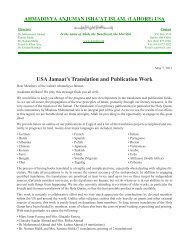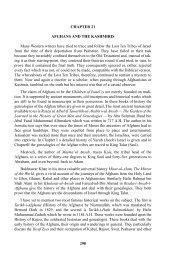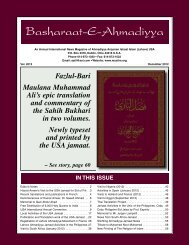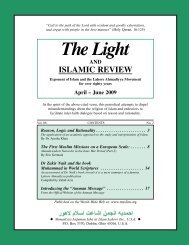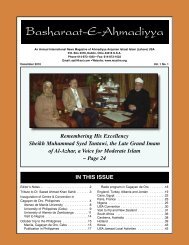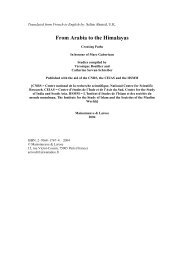Part 2] HARD TRIALS NECESSARY TO ESTABLISH TRUTH 69 152 ...
Part 2] HARD TRIALS NECESSARY TO ESTABLISH TRUTH 69 152 ...
Part 2] HARD TRIALS NECESSARY TO ESTABLISH TRUTH 69 152 ...
You also want an ePaper? Increase the reach of your titles
YUMPU automatically turns print PDFs into web optimized ePapers that Google loves.
76 Ch. 2: THE COW [Al-Baqarah<br />
Day, and the angels b and the Book c<br />
and the prophets, and gives away<br />
wealth out of love for Him d to the<br />
near of kin and the orphans and the<br />
needy and the wayfarer and to those<br />
who ask and to set slaves free e and<br />
keeps up prayer and pays the poorrate;<br />
and the performers of their<br />
promise when they make a promise, f<br />
imbue oneself with Divine morals as explained further on. But the words may also carry<br />
another significance. The Muslims were told again and again that all opposition to the<br />
Truth would ultimately fail and they would be masters of the land. But temporal<br />
greatness was not their real object. They may conquer Eastern and Western lands but<br />
their real aim was to attain righteousness and bring others to righteousness.<br />
177b. A belief in angels, while hinted at in the opening verses of this chapter, is<br />
clearly spoken of here as one of the basic principles of Islåm. The belief in angels may<br />
not be as universal as a belief in the Divine Being, but it is accepted generally in all<br />
monotheistic religions. As in the case of all other principles of faith, Islåm has pointed<br />
out a certain significance underlying the belief in angels. Just as our physical faculties<br />
are not by themselves sufficient to enable us to attain any object in the physical world<br />
without the assistance of other agents — as, for instance, the eye cannot see unless there<br />
is light — so our spiritual powers cannot by themselves lead us to good or evil deeds,<br />
but here, too, intermediaries which have an existence independent of our internal<br />
spiritual powers are necessary to enable us to do good or evil deeds. Now, there are two<br />
attractions placed in man — the attraction to good or to rise up to higher spheres of<br />
virtue, and the attraction to evil or to stoop down to a kind of low, bestial life; but to<br />
bring these attractions into operation, external agencies are needed, as they are needed in<br />
the case of the physical powers of man. The external agency which brings the attraction<br />
to good into work is called an angel, and that which assists in the working of the<br />
attraction to evil is called the devil. If we respond to the attraction for good we are following<br />
the angel or the Holy Spirit, and if we respond to the attraction for evil we are<br />
following Satan. Our belief in angels carries, therefore, the significance that whenever<br />
we feel a tendency to do good we should at once obey that call and follow the inviter to<br />
good. That it does not simply mean that we should admit that there are angels is clear<br />
from the fact that not only are we not required to believe in devils, whose existence is as<br />
certain as that of the angels, but we are plainly told that we should disbelieve in the<br />
devils (v. 256). As a disbelief in the devil means that we should repel the attraction for<br />
evil, so a belief in angels means that we should follow the inviter to good.<br />
177c. While a belief in all the prophets is stated to be necessary, the Book is spoken<br />
of in the singular. The Book therefore stands for Divine Revelation in general or the<br />
scriptures of all the prophets. Or, because the Qur’ån is a Book “wherein are (all) right<br />
books” (98:3), the Book might mean the Qur’ån.<br />
177d. The love of Allåh is here, as in many other places in the Holy Qur’ån, stated<br />
to be the true incentive to all deeds of righteousness.<br />
177e. Riqåb is the plural of raqabah, which literally signifies a neck, and then<br />
comes to signify by a synecdoche, a slave, or a captive (T, LL). Hence fi-l-riqåb means<br />
ransoming of slaves. The basis was thus laid down for the abolition of slavery.<br />
177f, see next page.


![Part 2] HARD TRIALS NECESSARY TO ESTABLISH TRUTH 69 152 ...](https://img.yumpu.com/11777151/8/500x640/part-2-hard-trials-necessary-to-establish-truth-69-152-.jpg)

